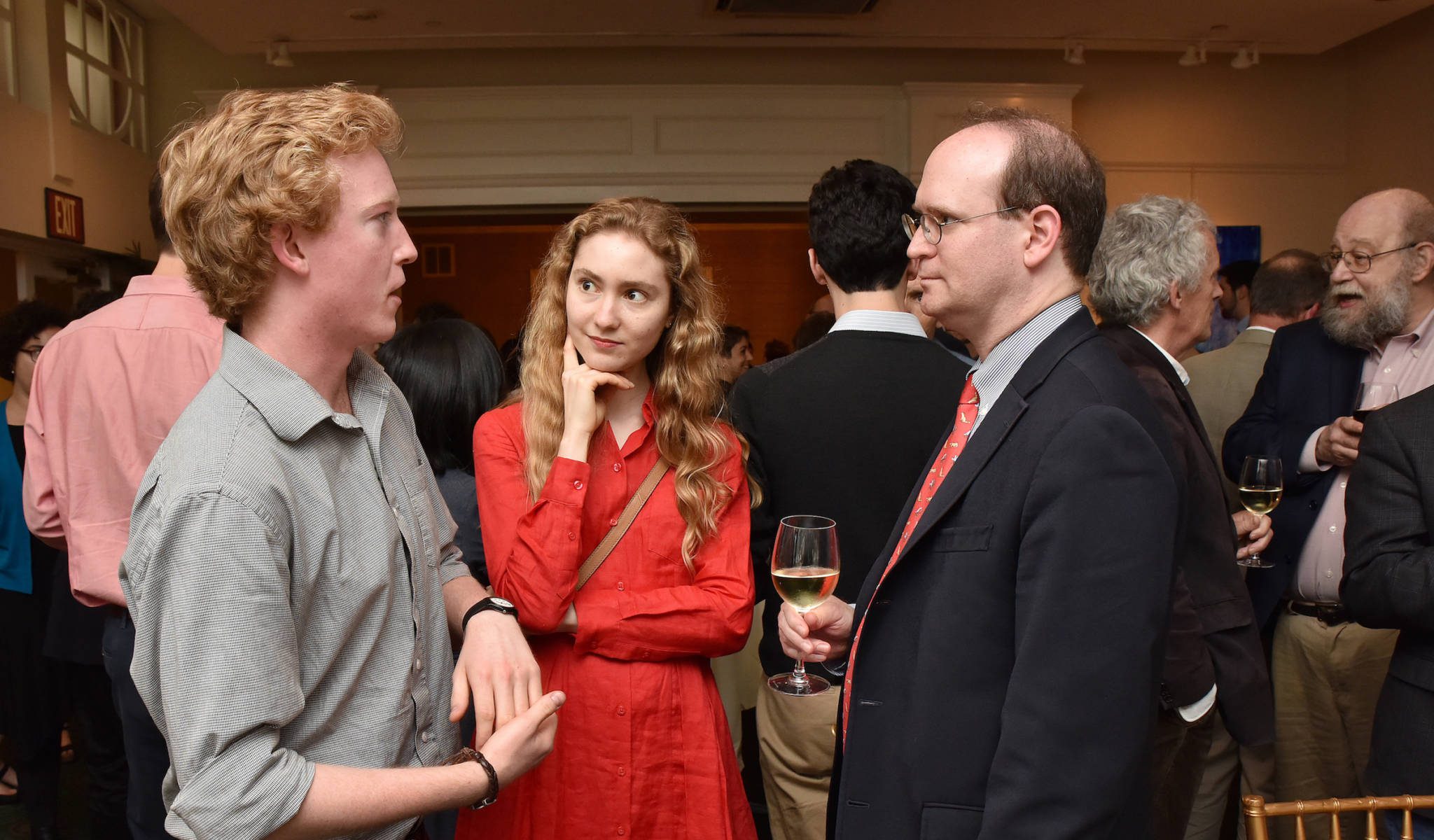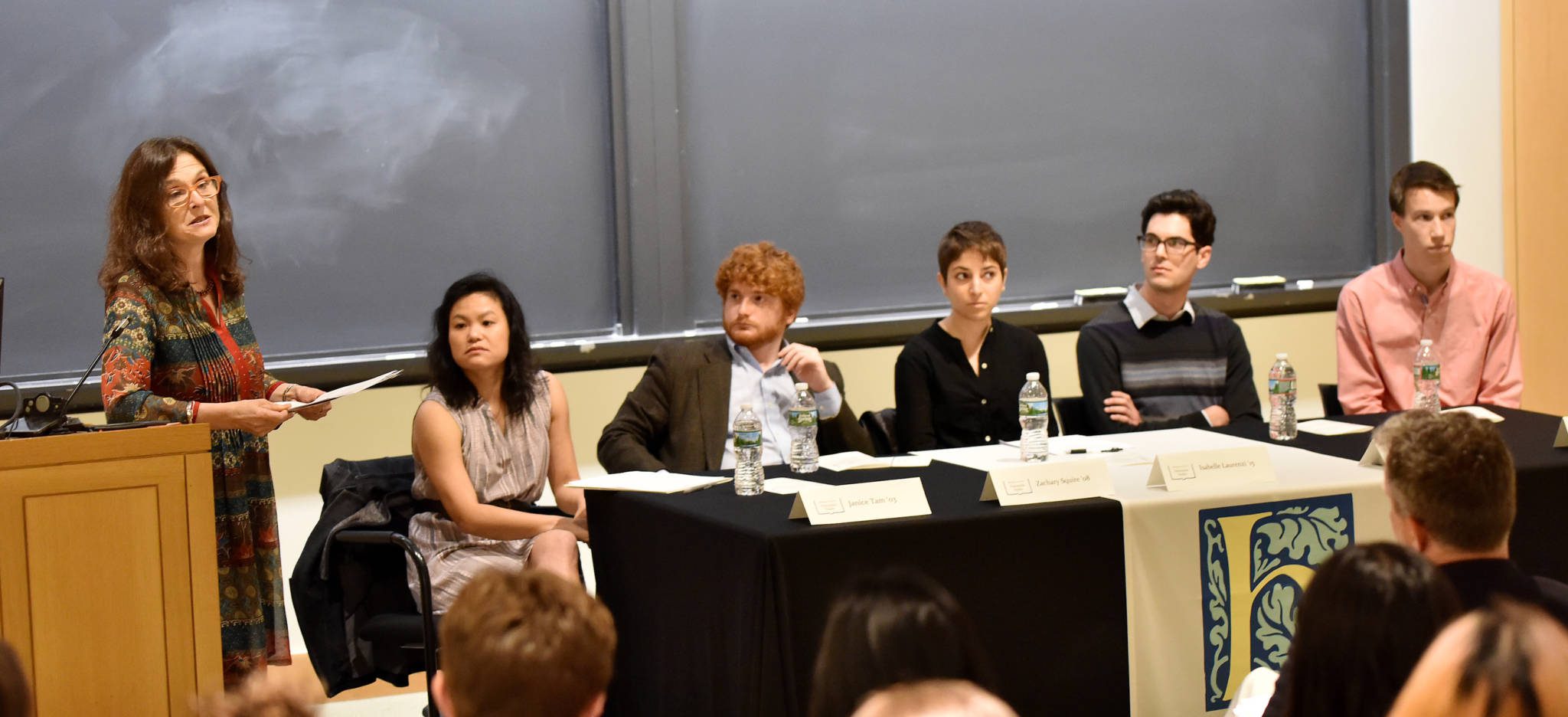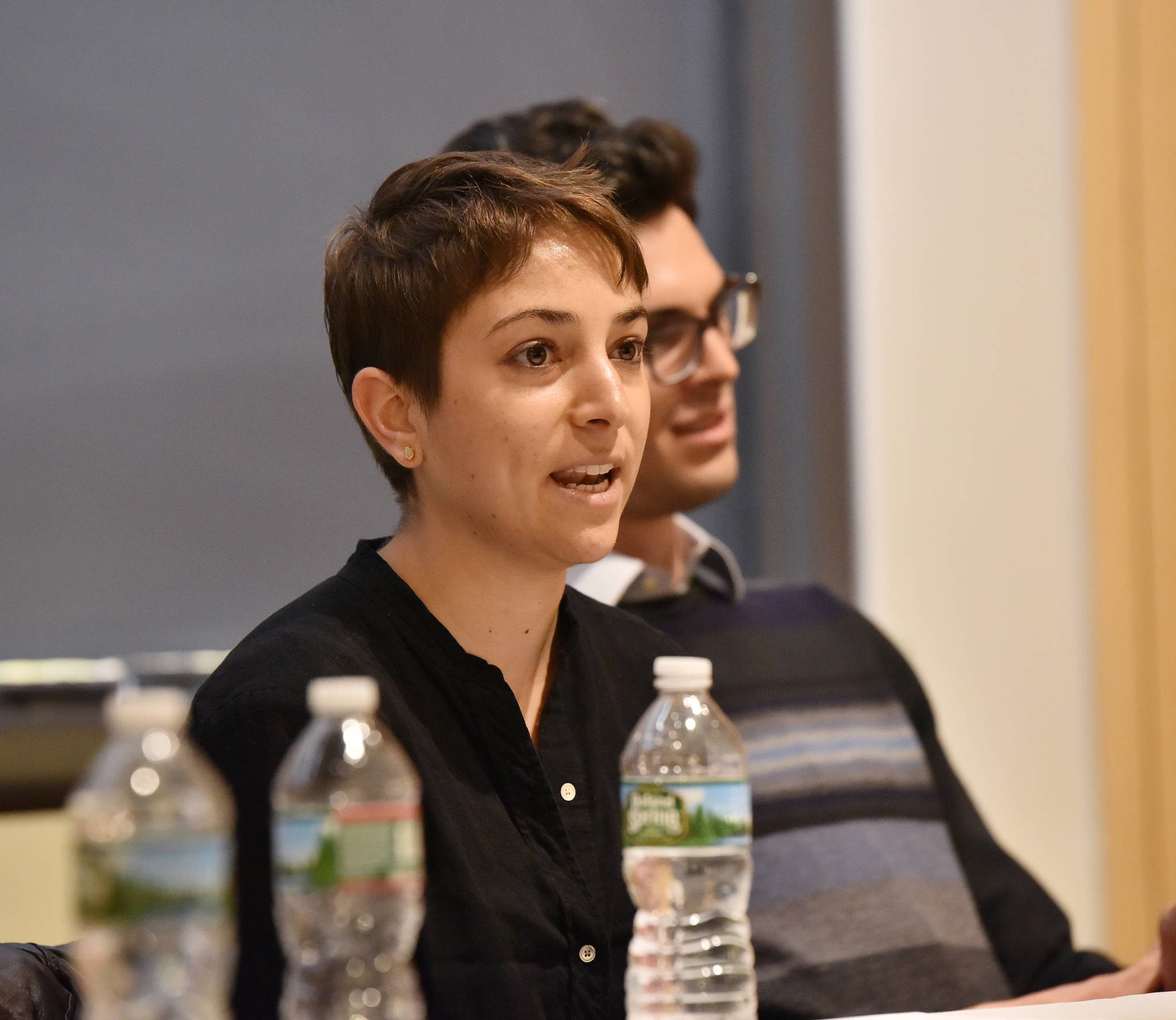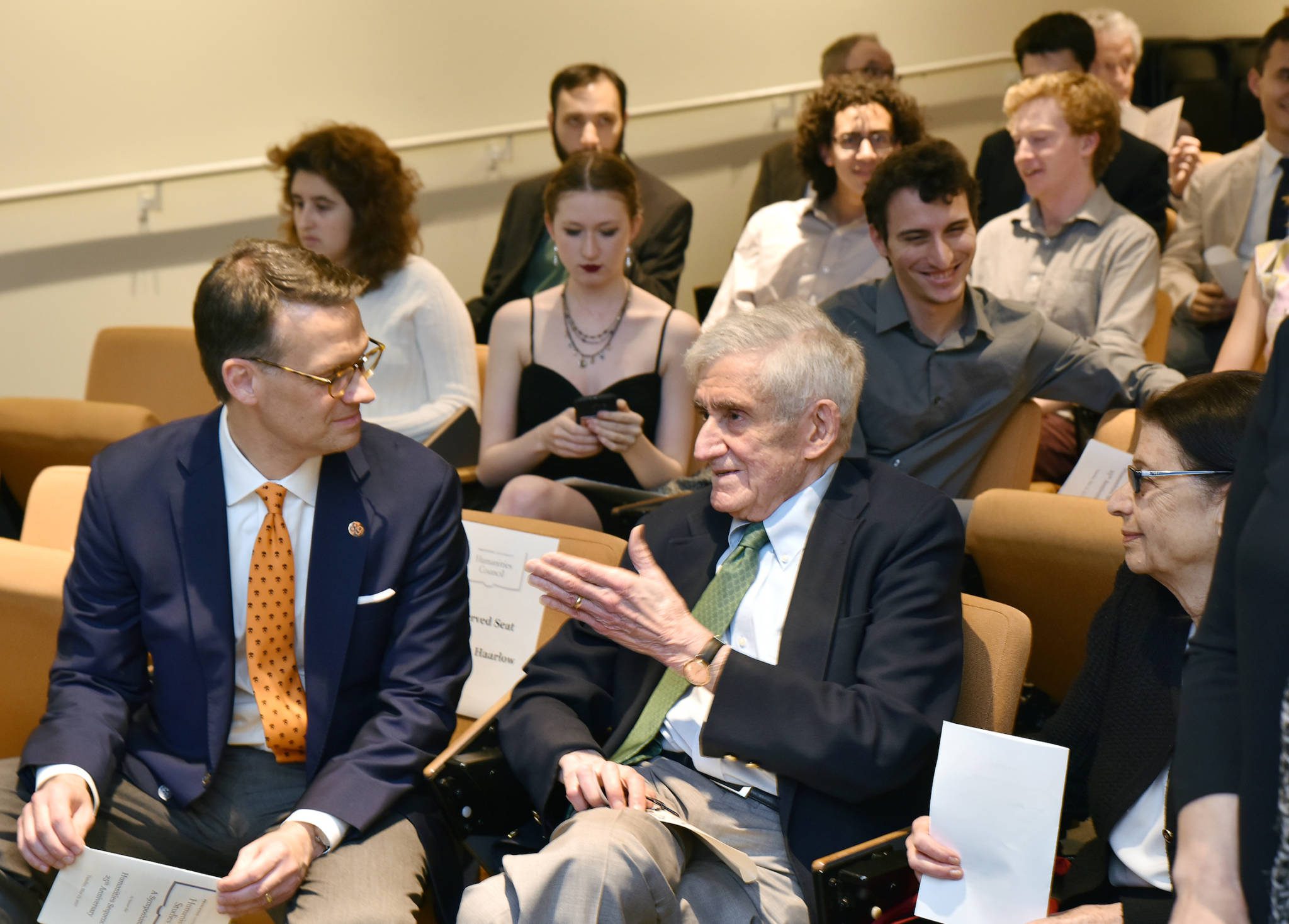Humanities Sequence founder Theodore Rabb will forever cherish the powerful meaning that towering figures from the course hold for alumni in the real world, he said at a May 23 symposium honoring the Sequence’s 25th anniversary.
He expressed astonishment that the Sequence had reached its current stature. It evolved from a humanities course with precepts led by professors of history, like himself, as well as of music, art, and literature. In the early 1990s, his colleagues Robert Hollander from Italian and John Fleming from English decided to make the class more intensive and useful for students. They hoped to examine the whole of texts, an endeavor that they realized would require a double-credit course per semester for two semesters. Following two years of preparation, the Sequence launched in 1992.
“Although the course has changed really quite dramatically from how it was originally, the emphasis always was, as my colleague P. Adams Sitney put it, to empower students,” Rabb said. That the Sequence, with its small beginnings, has entrenched itself at Princeton represents one of the great achievements of the University, he added.

Joshua Katz, Cotsen Professor in the Humanities and Professor of Classics in conversation with students.
In the past five years, the Sequence has added several new components, including Behrman Professorships in the Humanities, Humanities Mentors drawn from upperclassmen who have taken the Sequence, and sophomore study trips to Greece and Rome, according to Humanities Council Executive Director Kathy Crown. She thanked the Council’s former executive director, Carol Rigolot, who developed a new certificate program in interdisciplinary Humanistic Studies that has made this growth and momentum possible.
“Together these initiatives advance our larger vision for the humanities, and our understanding of critically important questions about the past, culture, belief, and knowledge,” she said. For supporting the expansion, she thanked the family of the late William Haarlow III ’63, the Class of 1970, and the Carpenters, Gardners, and Cones.
At the conclusion of the evening, Behrman Professors Esther Schor, Jeff Dolven, and Yelena Baraz presented gifts to the more than 30 students who had completed the entire four courses.
Graduates from the Sequence testified to its lasting legacy. Janice Tam ’03 majored in the Woodrow Wilson School with a certificate in European Cultural Studies, then attended Yale Law School. As an attorney, she co-founded Estatable, a software service for estate administrators, and serves as president of the board of directors for the Legal Aid Society of San Mateo County. Tam said the course remains one of her utmost learning experiences, having shaped her perception of the world and her life.
Reflecting on the Iliad by Homer, traditionally the first text in the Sequence, Tam noted that the mortal characters try to live honorably and with dignity in a chaotic, polytheistic world where they have little control. Their actions arise from base emotions like pride, jealousy, and vengeance, rather than the sense of good and evil or the desire for an eternal reward after death that may seem more familiar to us. Mortals, entire societies, find themselves mere pawns and playthings of the gods.
Though the barbarity depicted in the Iliad appears foreign, our world is not so different, Tam argued. “We are still manipulated by powerful and fickle forces — beauty, love, fame, power — forces that despite our offerings at their altar can change on a dime. Our quest is now for happiness or its loftier incarnation, meaning, with the assumption that this can be internally and personally derived. We are taught to worship the self: self-gratification, self-expression, self-care,” she explained.
She warned against the popular view that we have freed ourselves from the shackles of naïve beliefs and attained enlightenment.
“We may consult Instagram now rather than the oracles. We may believe glory means disrupting an industry, rather than a battlefield, and therefore we may write epics about Steve Jobs rather than Achilles. But let’s not congratulate ourselves too much by thinking we have progressed beyond our religious and superstitious ancestors. Perhaps we have actually regressed because we continue to be battered by forces beyond our control, and in our illusion of agency, we don’t even acknowledge them. At least the Greeks knew who to give an offering to. At least they knew they were creatures of fate,” Tam said.

Current Behrman Professor Esther Schor (English) introduces the Humanities Sequence alumni panel (from left, Janice Tam ’03, Zachary Squire ‘08, Isabelle Laurenzi ‘15, Paul Fanto ‘15, Steffen Seitz ’17).
Zachary Squire ‘08, who graduated as valedictorian with a classics degree, serves as chief investment officer and a founding partner of Tekmerion Capital Management. He previously worked at various hedge fund firms.
He recounted a lesson rendered salient through a juxtaposition of two works from the Sequence, Discourses on Livy by Machiavelli and The Apology by Plato.
“In a critical departure from previous political philosophers, Machiavelli clearly believes that being moral is not enough. Looking after one’s own soul is useless. The goal is actually to achieve practical benefits for one’s country,” Squire said. He contrasted Machiavelli with Plato’s Socrates, who to preserve his soul encourages his fellow citizens to bring doom upon themselves by condemning him and thereby staining their souls.
Squire indicated that the Discourses on Livy garners insight through the use of rational human inquiry to seek guidance and inspiration from the examples of others who have come before — the ultimate humanistic proposition.
“The past can be not only imitated, but improved upon,” Squire concluded. “In examining examples of the human condition to perfect the science of managing human affairs, Machiavelli places himself at the forefront of advancing the inquiry. Indeed, he states that men’s praise of the past is not always reasonable, and that deeds of the present might actually deserve as much praise.”
Paul Fanto ‘15, a physics major, is currently pursuing a PhD in physics at Yale with a focus on theoretical models of atomic nuclei. He echoed the verdict that any new idea is both built on and illuminates every way of thinking that preceded it. The Sequence provided him an overview of the canon that constituted a scaffold on which to stand and start building.
Isabelle Laurenzi ‘15, a religion major with certificates in Humanistic Studies and Creative Writing, has spent the past two years teaching English and an elective on feminism at the Riverdale Country School. She encountered John Milton’s Paradise Lost in the Sequence and went on to write a thesis on the concepts of covenant and reformation in his other books, like Eikonoklastes and Areopagitica.
“If the poetic brilliance of Paradise Lost swept me off my feet in a short-lived romance — after all, I only wrote one paper for HUM — the theoretical mysteries of the political tracts messaged their way into my mind and heart, and won a deep and enduring love,” Laurenzi said, noting that after analyzing Milton on monarchy and regicide, reformation and revolution, freedom and servitude, heresy and true virtue, she can never view Paradise Lost in the same light.

Isabelle Laurenzi ‘15
In times of uncertainty like her upcoming career shift, Paradise Lost‘s depiction of “mazy error,” meaning a labyrinthine wandering path, reminds her that unexpected fulfillment awaits. “Such is the joy of these texts that become our lifelong partners. We can return to them, and as we uncover new ways of seeing them, can also stumble into new ways of understanding ourselves,” she said.
Steffen Seitz ’17, who discovered a passion for philosophy through the Sequence, concentrated in the discipline while earning certificates in German, Humanistic Studies, and Creative Writing. His thesis tries to articulate a Platonic theory of punishment. Throughout his undergraduate years, he taught philosophy, creative writing, and current events in prisons through the Petey Greene Program and the Prison Electives Project. After graduation, he will coordinate tutoring programs in Boston prisons through a two-year Petey Greene fellowship.
Seitz attributed much of his passion for criminal justice reform to Plato’s Republic, which he read in the first semester of the course. The book defines justice in a structural manner, as the parts of a whole completing their proper tasks. The Republic therefore asks questions relevant to incarceration — what each part of the soul should do, or what each individual in the city should do — in a particularly potent way, he noted.
“By looking at these old texts and trying to interpret them, understand them, and reconstruct their arguments philosophically, we’re able to step outside of our own ideas and biases, and see them from a completely different, but comprehensive and coherent, worldview,” he said. Only in adopting each worldview by reading as charitably and rigorously as possible can we reevaluate and advance our own world, Seitz said.
Tam described the enduring gift of the Humanities Sequence as a sense of humility.
“For the rest of our lives, we ask, ‘Who are we? How do we know who we are? What is worth living for, dying for?’ And we examine our beliefs, ours and others’, with a sympathetic and searching eye.”
Read transcripts from Isabelle Laurenzi, Zachary Squire and Janice Tam.
















